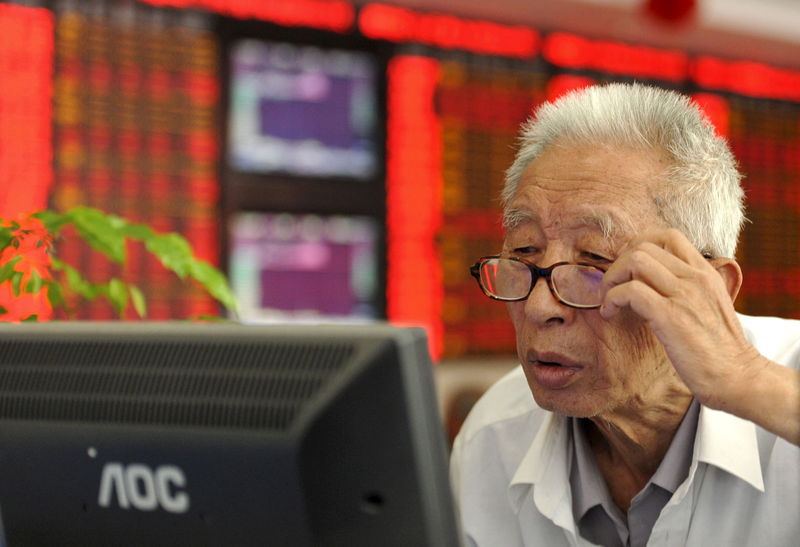By Koh Gui Qing and Kazunori Takada
BEIJING/SHANGHAI (Reuters) - Beijing's increasingly frantic attempts to stem a stock market rout were finally rewarded as Chinese shares bounced around 6 percent on Thursday, but the costs of heavy-handed state intervention are likely to weigh on the market for a long time.
The rebound came after China's securities regulator, in its most drastic step yet to arrest the slump, banned shareholders with large stakes in listed firms from selling. The banking regulator said separately it would allow lenders to roll over loans backed by stocks.
The CSI300 index of the largest listed companies in Shanghai and Shenzhen raced higher to close up 6.4 percent, while the Shanghai Composite Index bounced 5.8 percent for its biggest daily percentage gain in six years.
But China's malfunctioning stock markets remained semi-frozen, with the shares of around 1,500 listed companies worth around $2.8 trillion - roughly half the market - suspended, and many of those still trading propped up by state-directed buying.
"The authorities are capable of slowing the selling and extending market support," said Mark Konyn, chief executive officer at Cathay Conning Asset Management Ltd in Hong Kong.
"However, this high level of intervention comes at a significant cost. Such intervention locks up ownership of shares, reduces liquidity and creates an overhang that could plague the market for years."
More than 25 percent has been knocked off the value of Chinese shares since mid-June, and for some global investors the fear that China's market turmoil will destabilize the financial system is now a bigger risk than the crisis in Greece.
"We are inclined to believe that Beijing will escalate policy responses until they start working," said economists at Credit Suisse (SIX:CSGN) in a research note.
"If market conditions do not stabilize, we expect a statement of 'whatever it takes' from the Chinese government, given that social stability is at stake and financial systemic risks are evident."
The United States has voiced worries the stock market crash could get in the way of Beijing's economic reform agenda.
REFORM DERAILED?
The plunge in China's previously booming stock markets, which had more than doubled in the year to mid-June, has created a major headache for President Xi Jinping and China's top leaders, who are already grappling with slowing growth.
Beijing, which had made handing a "decisive" role to the market a centerpiece of its economic reforms, has responded with a battery of support measures, including an interest rate cut, suspension of initial public offerings and enlisting brokerages to buy stocks, backed by cash from the central bank.
"The government will be able to stabilize the market because they have a lot of tools in the toolbox," said Christopher Moltke-Leth, head of institutional client trading at Saxo Capital Markets.
"But it is concerning that the Chinese government doesn't allow market forces to work, and that's something China must change over time."
The Global Times, an influential tabloid published by the Communist Party's official newspaper, invoked the "national team" in an editorial rallying support behind the authorities' efforts to turn the market tide.
"While there are disaster victims everywhere in China's stock market, the other scene is that the 'national team' is truly taking action," the paper said.
"BIG FIST"
The China Securities Regulatory Commission (CSRC) said on its website late on Wednesday that holders of more than 5 percent of a company's stock would be barred from selling for the next six months.
The CSRC, which warned on Wednesday of "panic sentiment" gripping a market dominated by ordinary retail investors, said it would deal severely with any shareholders who violated the restriction.
The prohibition is unlikely to have much impact on foreign investors. No Qualified Foreign Institutional Investor (QFII), one of the main channels of foreign investment in China, holds more than 5 percent of a Shanghai or Shenzhen listed company. Foreign investors with more than a 5 percent stake in Chinese firms are all strategic investors.
As the daily barrage of official measures to prop up the market continued, the banking and insurance regulators announced a series of moves to ease margin lending requirements and terms on stock-backed loans.
Two Chinese development banks said they would not sell Chinese stocks, but would look to increase their holdings.
In the latest salvo against short sellers, who bet on falling prices, official news agency Xinhua said police were investigating suspected "malicious" selling of shares. The probe showed that the authorities would "punch back" with a "big fist" against illegal activities, Xinhua said on its microblog.
Some analysts believe more government action will be necessary in the coming days, as investors seeking to cut their risk exposure head for the exit on the back of any bounce.
"It is far from calling it a victory for the rescuers as more than half of listed companies are not trading in the market," said Du Changchun, analyst at Northeast Securities in Shanghai.
